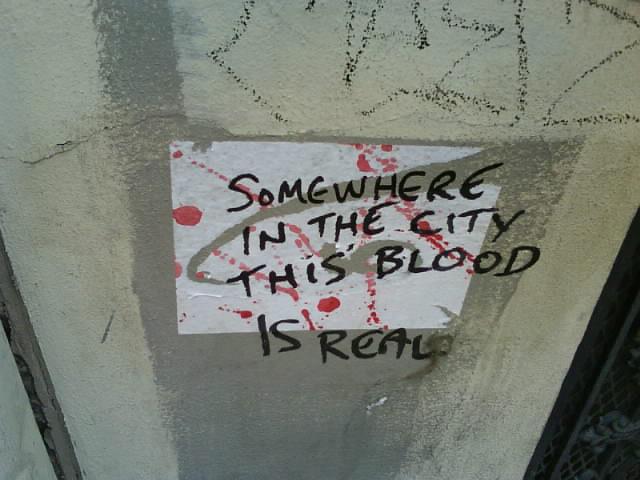
Catholic writers often find themselves in a weird position. We’re accused of being neanderthal conservatives on one hand and communist liberals on the other. And it’s not because we aim to find “the middle ground” or “see both sides.” Rather, Catholicism often represents a third way, the Gospel way, inspired by sacred scriptures and the teachings of the Church, and we find ourselves politically homeless, alien and strange to non-Catholics. Very often, the third way calls us to positions that are unpopular with almost everyone in the current American political climate, conservative or liberal. While we don’t seek to piss people off, it’s inevitable.
I wasn’t hugely surprised by some of the negative reaction to my post of last week on the worship of fear. Many accused me of being hopeless and divisive, implying that all white people are evil. I can understand some of those feelings. But that was not the intention of my post. Allow me to clarify.
Jesus says in the Gospel of Matthew that we must tend to the plank in our own eye before we can remove the speck of dust in our brother’s. To that end, I was examining the plank of sin in my own race, the shortcomings we share. I did so not to be divisive, but because I truly believe that in order for us to move forward, the plank must be addressed. Many people have thought I should point out the sins of the black community. I disagree for many reasons, not the least of which is Jesus’ warning against focusing on my brother’s speck of dust while ignoring my own plank.
I saw my post as a dose of strong medicine. I appreciate that some may not need that strong medicine. But I needed it.
I assure you, though, that I’m not hopeless. The Gospel of Christ is never hopeless. The past few days have been a wake up call, and people are responding to each other in loving ways. I think many of us have realized that we are staring into the abyss and we’re backing away from it.
For this post–in the interest of hopefulness and looking to the future–I want to offer my suggestions for how we white Christians might react in Gospel-centered love to the mess our country is in.
1. “Examen” Yourself and Repent.
We here at Sick Pilgrim love the Jesuits and Ignatian spirituality, which requires deep self examination of our own personal sins, not the sins of others. The Examen requires imagination and full honesty. When it comes to the particular issue of racism, we’re all guilty of it, because we’re all human. When someone adamantly says “I’m not a racist,” I wonder how honest they are being with themselves. When Christians overreact, myself included, it often shows they’ve not done good, hard, prayerful discernment.
We should react to current events and even criticism with reflection, not defensiveness.
2. Don’t Throw Stats.
Benjamin Disareli, British Prime Minister during the Victorian era, once wrote, “There are three kinds of lies: lies, damn lies, and statistics.”
Stats can be manipulated to say whatever we want. Throwing stats in this situation is especially unhelpful, because this is a heart issue. It’s about perception and proportionality. People want to be heard, to know their deepest feelings are dignified with a thoughtful response, even if we may not entirely agree with them. Posting memes or stats without context doesn’t convert others to your point of view and will just further alienate people.
3. Don’t Ignore History.
We have a bloody history in America. The Native American genocide is one glaring example. The African slave trade and Jim Crow laws are another. These are historical facts and we are still living with the repercussions, like it or not. We Americans have a tendency to ignore history, thinking the slate can always just be wiped clean. It explains why we went into Iraq, thinking we could fix the country.
People on both sides of this issue feel the way they do because of their relationship (or lack of it) to the history of race and violence, sin and brokenness in this country. No matter how much we can wish it away, it won’t.
Historical sin must be dealt with before a new day begins. When Northern Ireland finally signed its peace accord, Catholics and Protestants had to agree that each side had some valid points. They also had to repent their historical sins in the process.
4. Realize You Really Might Not Get It.
We must be willing to humble ourselves. A few years ago, I was talking with a black employee and I said, “Well, I don’t see you as black, I’m color blind.”
He shook his head and said, “I don’t want you to be color blind. I want you to see me as a black man with a unique experience that you don’t quite understand. Admit to me that you don’t get it and I’ll explain it to you. That’s what I want. And that’s more humanizing to me.”
That was a lesson in humility. By saying I was “color blind,” I was still imposing my culture and will on my coworker. I was in the position of power and still trying to dictate the conversation. Becoming “color blind”–erasing our differences and context and individual and historic experience–is not the goal. But recognizing we all have blind spots is a step in the right direction.
5. Listen, Listen, Listen. Oh, and Listen.
Listening is always better than reacting. We can’t dismiss someone as a racist or a cop hater right away, because we realize everyone has blind spots, including us (see No. 4). Do not be a narcissistic gaslighter by telling someone they’re crazy for feeling something. Feelings are valid. Saying we don’t have a right to them doesn’t help anyone. We must recognize our common humanity and the sins of all our hearts. We should dish out sacrificial love rather than defensive anger.
6. Realize the Solutions Are Not Simple.
Solutions to sin, deeply embedded sin, take a long time. They require continuous confession and bridge building. People can’t just get over stuff, especially if it effects them on a deeply personal level. It takes a long time to heal. And when you’re dealing with an issue that has such a vast history behind it, the healing will take a long time.
All of these steps require humility, grace and honesty while allowing people to disagree.
And hey, free hugs don’t hurt either.












